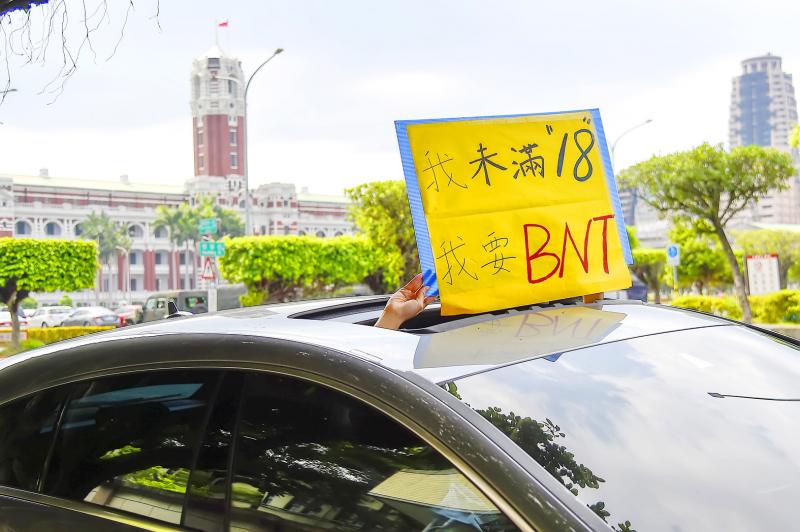The Executive Yuan yesterday confirmed that it had given the Buddhist Compassion Relief Tzu Chi Foundation the necessary documents for it to procure 5 million doses of the BioNTech COVID-19 vaccine.
The confirmation came after the foundation earlier said in a news release that it had signed documents with the government on Friday.
The foundation also thanked the government for its help, allowing it to hasten the process of acquiring vaccines and donating them back to the government.

Photo: Chen Chih-chu, Taipei Times
The Executive Yuan yesterday said the foundation can follow the model it set for Hon Hai Precision Industry Co-affiliated YongLin Foundation and Taiwan Semiconductor Manufacturing Co (TSMC), as the two entities also plan to acquire vaccines from BioNTech.
Tzu Chi on June 23 submitted its vaccine purchase plan to the Food and Drug Administration, but Executive Yuan spokesman Lo Ping-cheng (羅秉成) said the following day that it would not approve it.
However, the Executive Yuan on Wednesday approved the plan, after President Tsai Ing-wen (蔡英文) on June 26 talked with the foundation’s spiritual leader Master Cheng Yen (證嚴法師) and promised that the government would assist it in acquiring vaccines.
The foundation thanked the public for their encouragement, saying that Tsai and government officials had offered to help its efforts.
Lo yesterday also thanked the foundation for its efforts.
The government late last month authorized Yonglin and TSMC to represent it in negotiations to purchase up to 10 million doses of BioNTech’s vaccine, as the nation struggles with a vaccine shortage.
To date, Taiwan has received about 7 million doses of the AstraZeneca and Moderna vaccines from Japan, the US, vaccine manufacturers and through the global vaccine sharing initiative COVAX, government data showed.
Additional reporting by CNA

Alain Robert, known as the "French Spider-Man," praised Alex Honnold as exceptionally well-prepared after the US climber completed a free solo ascent of Taipei 101 yesterday. Robert said Honnold's ascent of the 508m-tall skyscraper in just more than one-and-a-half hours without using safety ropes or equipment was a remarkable achievement. "This is my life," he said in an interview conducted in French, adding that he liked the feeling of being "on the edge of danger." The 63-year-old Frenchman climbed Taipei 101 using ropes in December 2004, taking about four hours to reach the top. On a one-to-10 scale of difficulty, Robert said Taipei 101

Nipah virus infection is to be officially listed as a category 5 notifiable infectious disease in Taiwan in March, while clinical treatment guidelines are being formulated, the Centers for Disease Control (CDC) said yesterday. With Nipah infections being reported in other countries and considering its relatively high fatality rate, the centers on Jan. 16 announced that it would be listed as a notifiable infectious disease to bolster the nation’s systematic early warning system and increase public awareness, the CDC said. Bangladesh reported four fatal cases last year in separate districts, with three linked to raw date palm sap consumption, CDC Epidemic Intelligence

Two Taiwanese prosecutors were questioned by Chinese security personnel at their hotel during a trip to China’s Henan Province this month, the Mainland Affairs Council (MAC) said yesterday. The officers had personal information on the prosecutors, including “when they were assigned to their posts, their work locations and job titles,” MAC Deputy Minister and spokesman Liang Wen-chieh (梁文傑) said. On top of asking about their agencies and positions, the officers also questioned the prosecutors about the Cross-Strait Joint Crime-Fighting and Judicial Mutual Assistance Agreement, a pact that serves as the framework for Taiwan-China cooperation on combating crime and providing judicial assistance, Liang

US climber Alex Honnold left Taiwan this morning a day after completing a free-solo ascent of Taipei 101, a feat that drew cheers from onlookers and gained widespread international attention. Honnold yesterday scaled the 101-story skyscraper without a rope or safety harness. The climb — the highest urban free-solo ascent ever attempted — took just more than 90 minutes and was streamed live on Netflix. It was covered by major international news outlets including CNN, the New York Times, the Guardian and the Wall Street Journal. As Honnold prepared to leave Taiwan today, he attracted a crowd when he and his wife, Sanni,